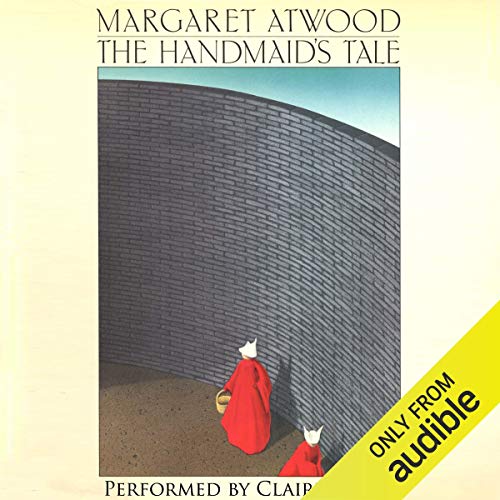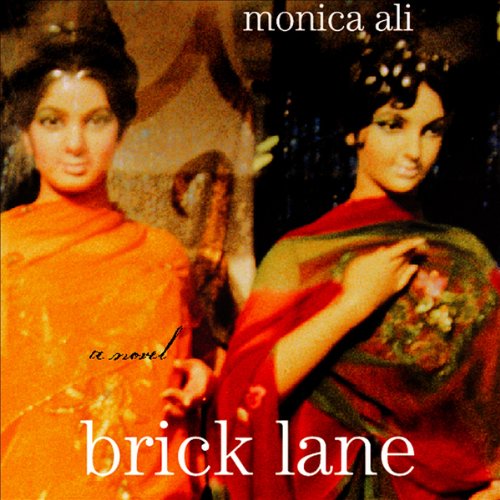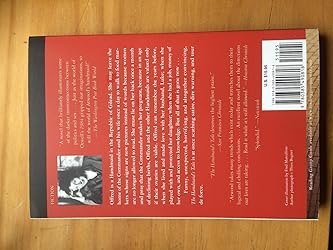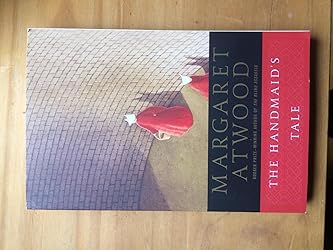
 Audible sample
Audible sample  Playing...
Playing... 
 Paused
Paused  Your audiobook is waiting!
Your audiobook is waiting!
Enjoy a free trial on us
$0.00$0.00
- Click above for unlimited listening to select audiobooks, Audible Originals, and podcasts.
- One credit a month to pick any title from our entire premium selection — yours to keep (you'll use your first credit now).
- You will get an email reminder before your trial ends.
- $14.95$14.95 a month after 30 days. Cancel online anytime.
Buy with 1-Click
-13% $21.83$21.83




The Handmaid's Tale
 Audible Audiobook
– Unabridged
Audible Audiobook
– Unabridged
Audie Award, Fiction, 2013
Margaret Atwood's popular dystopian novel The Handmaid's Tale explores a broad range of issues relating to power, gender, and religious politics. Multiple Golden Globe award-winner Claire Danes (Romeo and Juliet, The Hours) gives a stirring performance of this classic in speculative fiction, one of the most powerful and widely read novels of our time.
After a staged terrorist attack kills the President and most of Congress, the government is deposed and taken over by the oppressive and all-controlling Republic of Gilead. Offred, now a Handmaid serving in the household of the enigmatic Commander and his bitter wife, can remember a time when she lived with her husband and daughter and had a job, before she lost even her own name. Despite the danger, Offred learns to navigate the intimate secrets of those who control her every move, risking her life in breaking the rules in hopes of ending this oppression.
Cover Art by Fred Marcellino. Used with permission of Pippin Properties, Inc.
- Listening Length11 hours and 1 minute
- Audible release dateJanuary 1, 2012
- LanguageEnglish
- ASINB008X6SZ0K
- VersionUnabridged
- Program TypeAudiobook
 Read & Listen
Read & Listen
Switch back and forth between reading the Kindle book and listening to Audible audiobook.Add the audiobook for a reduced price of $6.90 after you get the Kindle book as part of your Kindle Unlimited subscription.
People who viewed this also viewed
- Audible Audiobook
- Audible Audiobook
- Audible Audiobook
- Audible Audiobook
- Audible Audiobook
People who bought this also bought
- Audible Audiobook
- Audible Audiobook
- Audible Audiobook
- Audible Audiobook
- Audible Audiobook
Related to this topic
- Audible Audiobook
- Audible Audiobook
- Audible Audiobook
- Audible Audiobook
- Audible Audiobook
Product details
| Listening Length | 11 hours and 1 minute |
|---|---|
| Author | Margaret Atwood |
| Narrator | Claire Danes |
| Whispersync for Voice | Ready |
| Audible.com Release Date | January 01, 2012 |
| Publisher | Audible Studios |
| Program Type | Audiobook |
| Version | Unabridged |
| Language | English |
| ASIN | B008X6SZ0K |
| Best Sellers Rank | #727 in Audible Books & Originals (See Top 100 in Audible Books & Originals) #8 in Dystopian Science Fiction (Audible Books & Originals) #21 in Dystopian Fiction (Books) #41 in Literary Fiction (Audible Books & Originals) |
Customer reviews
Customer Reviews, including Product Star Ratings help customers to learn more about the product and decide whether it is the right product for them.
To calculate the overall star rating and percentage breakdown by star, we don’t use a simple average. Instead, our system considers things like how recent a review is and if the reviewer bought the item on Amazon. It also analyzed reviews to verify trustworthiness.
Learn more how customers reviews work on AmazonReviews with images
-
Top reviews
Top reviews from the United States
There was a problem filtering reviews right now. Please try again later.
Don't worry, it won't be. However, it does have some elements that could be argued as being a caricature of modern day happenings. There are plenty of reviews out there that give a run down of the plot and how they feel it's all happening right now. No doubt many of these reviews are from women, and justifiably so since this book "speaks to them". So I'm going to discuss the subtext of the novel, and hopefully, I can get a few guys to read this book because there is stuff in it for them.
The background story is that The United States has been taken over by religious fundamentalists. The religion is never mentioned by name, but it is clearly Christian/Jewish/Islamic. When it comes to their respective flavors of fundamentalism, they all bear a striking resemblance to one another whether they want to admit it or not. This is not surprising, since they all worship the same god and use overlapping religious texts. If you're curious about the tale of how this happened, this is not the book for you. After all, this is the Handmaid's Tale. All you get is the story of one woman starting probably about 10 years after an event called "The President's Day Massacre", i.e. the coup where the fundamentalists took over.
Personally, I do not think such a regime could take over in such a simple manner, but what followed after the coup is more plausible. As I said, we don't get much of this story directly, but we hear snippets of how, slowly, over the course of weeks and months, oppressive policies are implemented and they are always implemented for the same reasons that such policies are implemented today. Namely, the safety of the public, the betterment of society, etc. At the same time, women are slowly and unequally stripped of their rights.
If you think that women could never be usurped of their identities in this way, and no one would stand for it, blah, blah, blah. You are wrong. All it takes is the right social pressure. Imagine a scenario where the number of women capable of bearing children is cut to a small percentage. They then become a "national resource". (My words, not the author's.) When it comes to resources, there will always be people (usually men, and this is coming from a man) in power who will want to exploit and seize control of such resources. This is how such things can happen. And this is the scenario used by Atwood in The Handmaid's Tale.
When I was younger, I probably would never have bought that line of reasoning and not terribly enjoyed this story. As I've aged to a venerable 40 years and some of my Platonic idealism has tarnished, I have learned to accept that "the masses" don't get as outraged as individuals do. Most of the time, groups of people are scared when it comes to dramatic change and accept it if fed the line that it is temporary and for the good of all. Most of the time, these changes are never about being for the good of all, they are simply about control.
A past example to show even women are not above this: The Temperance movement to abolish alcohol. Propelled by religious minded women, fresh with their new ability to vote. Despite Jesus being pro-wine they felt it their duty to rid the world of drink. You can argue the details all you want, but at the end of the day, it was about asserting power and control.
A modern example: For the past 12 years, the U. S. citizens have been force fed the line that we are all living under a faceless threat of "Terror" and in this time we have fought two wars, one of which we are still fighting, and most of us don't really know why, other than we are "fighting terror". These wars are not as openly covered as the Vietnam War, because our government has learned that atrocities that are not visited daily are quickly forgotten because people prefer to stick their head in the sand. And so people forget. They don't get outraged. They simply accept the situation because it is supposedly temporary, for the good of us all, for all our safety, blah, blah, blah. What are we looking to control? Some say oil, others say that the area is strategically located real estate. Regardless, it is about control.
So do I think a "fast coup" could take over and make such radical changes? No. But a slow insidious change over the course of a decade or two? Well, I have seen it with my own eyes, so yes, the scenario in The Handmaid's Tale is plausible to me, but I know that such a shift would happen over years, not months. Anyone who thinks otherwise is sticking their fingers in their ears, closing their eyes, and repeating the above blah, blah, blahs.
A possible future example that's been a long time in the making: During the 80's (my youth) religious fundamentalists (in this country) blew up abortion clinics because they were outraged and wanted change. Presumably, they wanted things to return to the way they were when abortions were illegal, in back allies with coat hangers. Just in my lifetime, they have since learned that getting people upset only motivates them to stand with or against you. And if you're the one blowing up teenagers, it's tough to motivate people to stand with you. They have taken their fight political, a realm where everybody's eyes glaze over and become dispassionate, and they have slowly set about making laws against birth control and abortion clinics. As someone who is pro-choice, I can't say all of these laws are bad. Many are simply requiring clinics to uphold standard medical cleanliness practices. The laws that really hurt, are the laws that reduce or eliminate funding preventing the clinics from having the money to be able to upgrade their facilities and are forced to shut down. You can tell this is about the control of others and not about any religious objection because the number one cited religious reason is the belief that life begins at conception. Rather than supporting research for birth control that simply prevents conception, they politically attack all avenues of abortion and birth control. So even if you address their concerns, it does not change the way they behave.
Leaving the examples and subtext behind, back to the story at hand. The Handmaid's Tale is true literature, thus by practical definition, this makes the story a little slow and boring at points. When I was in college, I had to take plenty of slow and boring classes that I thought were of minimal value. However, I quickly learned that it is possible to garner lessons from and learn something from every class and that is what I set out to do. I took it upon myself to walk away with something for my time and money. This book requires that same model of thought. Even after 28 years, there is a wealth of intriguing thought experiments that went into the writing of this story and a similar trove for those willing to consider the next step of reasoning, but you have to be willing to dig for that gold.
And there you have it. The subtext of The Handmaid's tale is a marvellously thought provoking book about the subtleties that go into how societies change, but if you're not interested in thinking, move on to something formulated for entertainment purposes this is not the novel for you.
After watching the excellent Hulu series based on Margaret Atwood's book, I had to read the original source material. The series (and concept) is so fascinating (and scary) that I wanted (needed) to see how it compared. Most of all, in the era of "President" Trump, it's a bit too realistic of an idea that's not too hard to imagine actually happening under his Republican regime. This is one case where I thought the movie/show was better than the book. The TV series follows the original book very closely, but goes into so much greater detail, giving us more insight into the characters and society. Of course, Atwood had just 300 pages to fill, whereas the TV series had 10 hour-long episodes. I won't spoil anything, but I will note that the book does end similarly to the season finale of the first season of the TV series.
This is my first book of Atwood's, and I can already tell that I want to read more of her many, many novels in the future. She's got some pretty interesting and frightening ideas about alternate futures and realities. Her writing itself is very easy to read, even though there were times in this particular novel where I felt she was rambling and could have given us more information and insight into Offred or society rather than rambling about things we already read before. She also goes back and forth between using quotation marks around spoken words, which is distracting. In some cases, she used them and in others, she didn't. This is a pet peeve of mine; I prefer (and learned in my creative writing and English classes) that all spoken words should be in quotation marks, not just for proper grammar, but because it makes for an easier read, defining exactly what is dialogue and what is descriptive text.
"The Handmaid's Tale" is definitely worth a read, but I also highly recommend watching the TV series as well.
Top reviews from other countries
OK, the each their own, but even the most rudimentary of content descriptions makes clear that this is a dystopian novel that is – from Amazon’s own opening blurb – “a stunning Orwellian vision of the near future (where) Handmaids . . . have only one purpose: to breed.”
It goes on to describe the story as “Provocative, startling, prophetic . . . at once a mordant satire and a dire warning.”
So, no, this will not be everyone’s cup of tea. Some may find deeply disturbing the things Atwood conceptualizes; may choose to see such things as simply impossible, or may choose to simply dismiss the story and or author for what they perceive are the failings of either. All of these, I find, to be quite acceptable, but the “I didn’t know what I was buying” or “It wasn’t what I expected,” excuses truly fall flat. (Save them though, since they might be usable if you ever buy a can of paint without a label or, in doing so, find the colour to be Shocking Pink when you “expected” it to be Moss Green).
The Handmaid’s Tale is brilliantly written and will, in my view, be a novel read (and reread) for a very long time.































